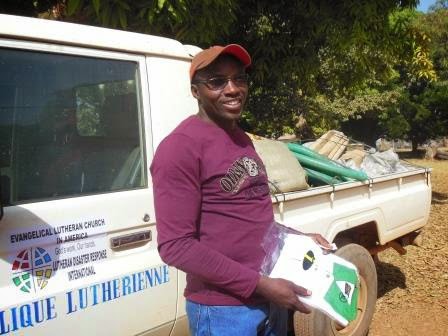Two weeks ago, I wrote about Gearing Up for
the Lutheran Disaster Response (LDR) Humanitarian Aid project in the Bohong
area of CAR. Today, I want to share some
news from the other side of the border.
It is true that I have not been in the Central African Republic, but some
of those working on the project have been to Garoua Boulai to get supplies for
the work. They have brought news and some
pictures. Here’s a little information
about work that is getting started and getting done!
Building
Houses

First, members of the Evangelical Lutheran
Church – CAR (EEL-RCA) went to five villages to explain the project to village
leaders. After discussion, they enrolled
the teams. The next week, they returned
with tools – in pieces for easier transport.
Now, teams of villagers are working together and sharing tools.
To build houses the teams are making mud
bricks, but this is the dry season. So,
they first need to pump water (with motors provided by the project) into large
1,000 liter containers (also provided by the project – and pictured in the blog
two weeks ago). Bricks are then fired in
a village-made kiln to make them stronger.
Walls are built – with even the youngest
helping at times! Later, grasses (cut in
the bush) will be tied together and attached to the roof frame.
Building
Spring Boxes
Many springs in the area form small ponds
where women have gone for water. The
problem is that this water is stagnant, often dirty, and a breeding ground for
mosquitos and other germ-borne illnesses.
The first picture shows women getting water from such a spring and
transporting it to their homes on their heads.
(Note: do you know how heavy water is? It weighs 8 pounds a gallon – so these basins
probably weight more than 30 pounds each.)
Once women arrive at home the open containers also present sanitation
problems as germs can easily contaminate all the water and provide other places
for mosquitos to breed.

The Project for the Development of Springs
(PASE) workers already work in the region around Baboua. They were included in this project to
build/repair spring boxes in the same villages where the houses are being
built. The PASE team also built a roof
so that women don’t stand in the sun or rain (when that season comes) as they
get water. The other picture is a women
getting clean water and putting it in a container with a cover to help keep it
clean. (Note: it still weighs a lot! And, is still carried
on her head.)
Health
Care
In the same villages children are being
vaccinated and basic health care is provided.
I don’t have any pictures of this work yet, but here is a photo of the
project team being welcomed into the village.
People cut some greens to wave in celebration. You can imagine how thrilled they are to have
support to begin rebuilding their lives.
Seed
Distribution
Last year, emergency humanitarian
aid
proved seed to some villages. Seed,
though, is still hard to get – because of lack of availability and because most
people don’t have the money to buy what is available. Sometimes people put their money together to
try to get what was needed, but the situation is still critical. Of those who got seed last year, some could
not save any to plant this year – the hunger situation was too extreme and they
needed to eat that they grew.

 This year’s aid will provide seed in March
at the beginning of the rainy season. In
the meantime, the Association of Volunteers for the Protection of the Environment
(AVPE) team members are planting demonstration gardens to help villagers learn
methods that are better for the environment.
This year’s aid will provide seed in March
at the beginning of the rainy season. In
the meantime, the Association of Volunteers for the Protection of the Environment
(AVPE) team members are planting demonstration gardens to help villagers learn
methods that are better for the environment.
A lot of work is being done by village
teams and EEL-RCA project staff in order to implement the LDR Humanitarian Aid
Project. I am sure that what I have
reported here is just the tip of the iceberg.
Along with all of the material progress, these people are also
rebuilding their communities and their hope for the future.






























